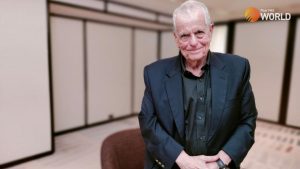Soon, cancer patients will have an additional treatment option, moving away from relying solely on chemotherapy, which often has deleterious side effects. The current one-size-fits-all approach to treating many diseases will soon be replaced by personalized (or precision) medicine.
Technion Laureate, Professor Aaron Ciechanover, shares groundbreaking insights into the future of medicine, revealing how personalized treatments are revolutionizing cancer care and offering valuable perspectives on the quest for eternal youth.
Essentially, the patient’s DNA will be sequenced, to analyze subclass diseases and identify the cause of the mutation. With a better understanding of disease mechanisms, patients can be diagnosed with great precision and the treatment can be tailored specifically to the target. For breast cancer alone, there will be more than 20 drugs designed to cure each specific type.
Thai PBS World spoke to Professor Aaron Ciechanover, a 2004 Nobel Laureate in Chemistry, along with two other scientists who discovered the mechanism by which the cells of living organisms remove unwanted protein, known as ubiquitin-mediated protein degradation. This discovery has significantly advanced research on new pharmaceuticals and the development of personalized medicine. He shared his views on future innovations based on personalized medicine, longevity and why he finds science so fascinating.
The secret of longevity
With tailored approaches in medical treatment, people could live longer, perhaps much longer than they do now, enjoy a better quality of life and some diseases could be cured completely.
Analysis shows that the factors behind longevity are, however, various. It could be attributed to a healthy diet, regular exercise or even something in the genes. If we sequence the patient’s genome, we could find clues as to why they live longer than average.
Once we can identify genes that are associated with longevity, by using AI sequencing and information technology to understand the factors contributing to initial long life, we can manipulate it.
“Then I have to change your genome, to make it like the genome of the 110-year-old person. So, that raises an ethical issue, whether I want to touch your genome. That’s another issue”, said Prof. Ciechanover.
Staying young
Being centenarians will become more common, but most people don’t want to look their age. Nowadays, people put a lot of money and effort into looking younger than they are.
The global anti-aging products and services market was valued at US$64 billion in 2023 and is anticipated to grow to US$109.8 billion by 2033, according to futuremarketinsights.com.
So, from a scientist’s point or view, will there be any breakthroughs to maintain our youth?
“No real solution. I don’t know how to keep you young but, maybe, if you get to my age, you don’t care so much. Why do I care if I have white hair? Do you want to look young all your life, until 120?” Prof. Ciechanover asked.
Then he pointed out that people who want to look young can go to a plastic surgeon and spend 100,000 baht or maybe half a million baht. The surgeon will take away the wrinkles and, for a year, they will look nice. Then, after a year, the wrinkles will come back. Subsequently, they will have to spend another half a million baht, because they cannot compete with age.
People can, however, slow ageing a bit, if they take exercise or eat healthy food. In his opinion, age also has an impact on one’s thinking, and appearance is not as important as being healthy and smart.
The intriguing world of science
In his early life, Prof. Ciechanover was a medical student and trained as a surgeon. He later moved into the world of science and earned a doctorate in biology. The reason behind this decision was his realization that, when patients become sick, such as with cancer or heart diseases, and come to the hospital, it’s often too late. The disease started long ago, but people didn’t realize it.
Hence, he decided that he wanted to understand why diseases start “And I saw that, in science, I would understand how it started. Therefore, I decided to bid farewell to medicine and say hello to science,” he said.
For him, what makes science so interesting is discovery. Scientists are digging into nature’s problems and solving them.
“We didn’t create nature. Nature is already there. We discover the secrets of nature and then manipulate them in order to develop drugs to combat diseases. That’s fascinating,” he said.
He compared this to playing chess with God, which he finds truly captivating.
At present, Prof. Ciechanover is a Distinguished Research Professor at the Rappaport Technion Integrated Cancer Center (R-TICC), Israel.
In addition to the Nobel Prize, Prof. Ciechanover has garnered numerous accolades. With a publication record of more than 200 articles and book chapters, his impact on science and humanity has earned him honorary doctorates from over 50 universities.
Despite the time it took, Prof. Ciechanover says he has had a very interesting and successful journey in science.


